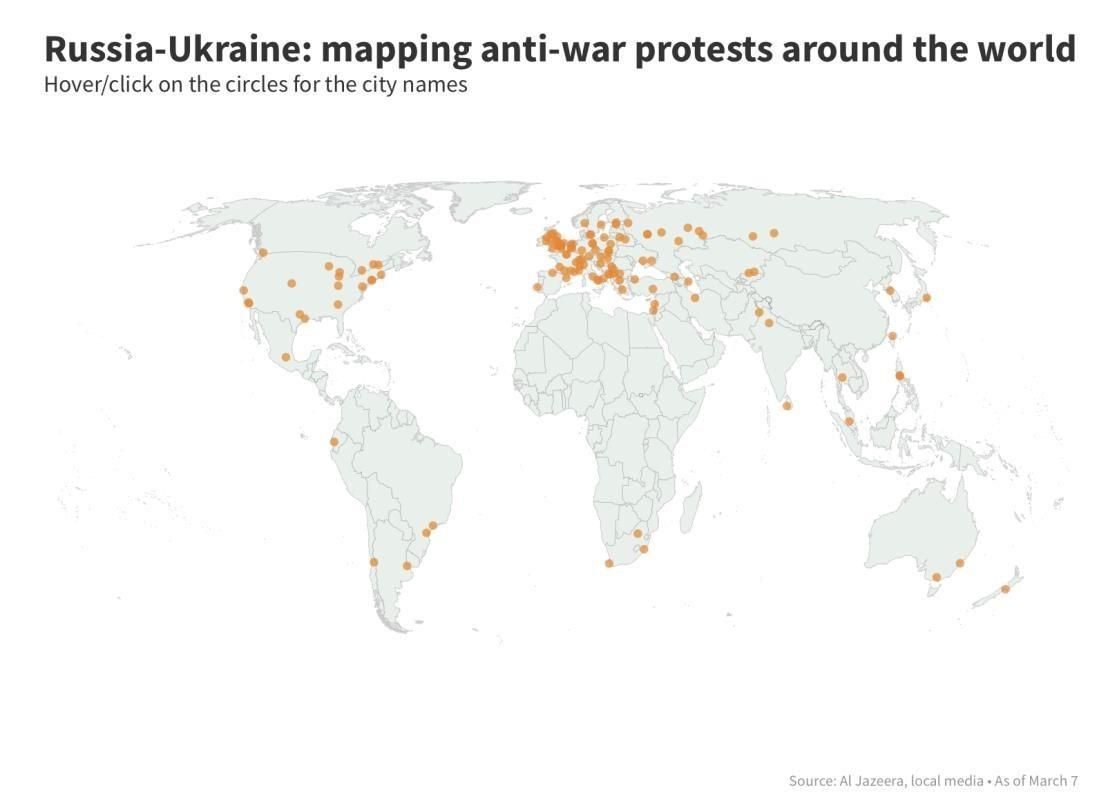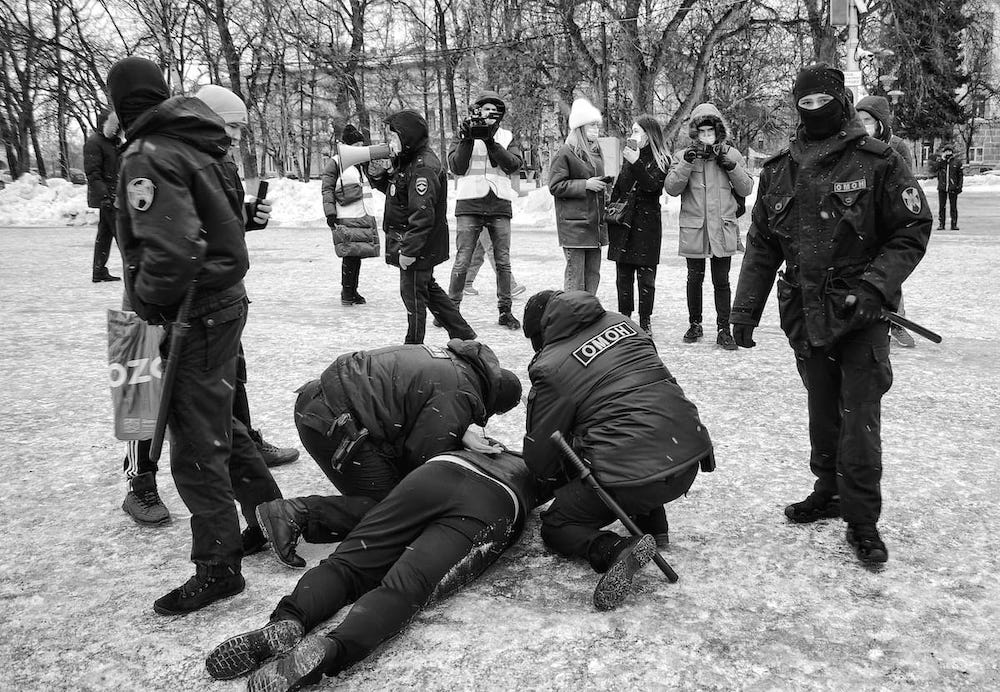Since World War I, combatant parties have used propaganda to sway public opinion. Russia’s ongoing war on Ukraine offers a vivid illustration of how propaganda has evolved into one of the most effective strategies for gaining international support today.
It is widely believed that all Russian attempts to justify the invasion failed terribly because of the abundance of available Western sources that puncture the Russians’ claims; as Will Duffield, a policy analyst from the Cato Institute says, “people were not buying” them. I will refute Duffield’s arguments, who contends that Russian propaganda has completely lost in the battle with Western journalism, uncensored social media, and Ukrainian counter-narratives. I will provide counterarguments to these claims, backed by empirical evidence and academic literature. Firstly, before arguing that the Russian propaganda miserably failed, I suggest taking into consideration the reaction of non-Western countries to the war in Ukraine. Secondly, in the attempt to hypothesize the perspective Duffield might be embracing, I will rely on the four theories of the press, theorized by Fred Siebert, Theodore Peterson and Wilbur Schramm, particularly on authoritarian and libertarian media theories, which have been greatly influencing journalism studies and journalism education since their publication in 1956. Then, I emphasize that in authoritarian regimes where freedom of expression and political dissent are heavily suppressed, people tend to use other channels to voice their opinion. The absence of anti-war protests does not necessarily reflect the support for a government’s policy but may reflect other factors such as fears of reprisals, persecution, or a sense of helplessness with the effectiveness of protesting.

Russian Propaganda Lost in the West, but the West is Not the Entire World
Duffield’s argument that Russian propaganda has failed is accurate only to a limited extent. Generally, Russian propaganda failed predominantly in the West; however, it hardly had the same effect in the Global South. When comparing anti-war protests around the globe, it is clear that in other continents the number of demonstrations is significantly lower (see Image 1). Russian propaganda might have contributed to the lack of anti-war activism, in addition to other factors like historical memory from the USSR's assistance in the struggle against colonial rule and Russia's expanding influence in the political and military spheres. Colonial memory made Global South countries such as China, India, South Africa, Pakistan, Sri Lanka, and much of Africa and Central Asia united in their criticism of Western hypocrisy and double standards concerning democratic values and the rule of law. Therefore, the crisis in Ukraine is rather seen as a great power battle, with a fundamental confrontation between the West and Russia, in which there is no desire to intervene. It is also essential to consider how the most impoverished countries in Africa, South Asia, and the Middle East, which primarily rely on Russia for food imports, make political decisions based on immediate concerns. On top of these reasons, Moscow is becoming more active and opening new Russia Today (RT) bureaus as well as radio stations in Africa and Latin America. RT is a state-controlled international news television network, and it is setting up its first localized African hub in South Africa. Meanwhile, the Facebook page of RT Español has more than 18 million followers, making it one of the most popular news sources in Latin America. The importance of Russian propaganda in the Global South was also acknowledged by Dmitro Kuleba, the Ukrainian minister of foreign affairs who emphasized that “Today, it is crucial to combat Russian propaganda not only in Western media but also in Asia, Africa, and Latin America.”
Authoritarian media in Russia against libertarian media in the West
Will Duffield's attempts to describe the battle between Russian and Western media are well-explained by the “Four Theories of the Press”. Fred Siebert, Theodore Peterson and Wilbur Schramm, the authors of the four normative theories, would describe the Russian press as authoritarian, arguing the key role of the government in the control of information. This theory is even more applicable now, when through new legislation the Russian government has the right to filter any news and revoke press credentials whenever state’s interests may be at risk. The libertarian theory, by contrast, is characterized by a fully free media without any intervention of any authority or government. Moreover, in libertarian press contexts, people are understood as logical beings capable of reasoned decision-making. Although in all likelihood unconsciously, Duffield firmly shares this idea: “Western media consumers had no desire to buy Russia's claims because [...] people can see.” However, there are a number of caveats to this idea of a Western “free” press.
Such a Western-centric approach is rooted in Walter Lippmann’s theory as well as in Harold Lasswell’s theory of propaganda (1927). They both claimed that the effectiveness of propaganda was rather conditioned by the vulnerable mentality of the general populace than by the content of messages. Political essayist Eric Alterman (2011) summarized Lippmann’s position as the following: “Lippmann famously compared the average citizen to a deaf spectator sitting in the back row. He does not know what is happening, why it is happening, and what ought to happen. He lives in a world he cannot see, does not understand, and is unable to direct”. This perfectly reminds us of how Russians are seen as incapable of carrying out the filtration of information.
Duffield’s implicit perception of propaganda as a useful conceptual tool applied to media products exclusively in dictatorships is misguided. Given the money and efforts put out in counter-propaganda campaigns, it is doubtful that the Western media is absolutely free and independent. For an extreme example, in 1988, Noam Chomsky and Edward Herman described the systemic biases in the US mass media. The authors analysed included and excluded third world elections in the New York Times, Freedom House exclusives and other media sources to conclude that the propaganda function is an enduring aspect of Western media systems. Their model may be just as helpful today as it was in 1988 in examining stories in terms of a systematic bias in favour of entrenched authority.
In Duffield's view, while the Kremlin’s narrative did not work on the Westerners, Russians bought into the regime’s claims. While it is true that many are influenced by propaganda, it is important not to make generalizations about the entire population. I contend that not all individuals are equally susceptible to this powerful force, and many do actively resist attempts to manipulate their beliefs. Widespread opinion in the West that Russians believed the regime’s claims speaks about the bias about Russians’ inability to critically filter information. It is a blatant example of the use of dualisms like developed/undeveloped, and "us" and "them." And while "they" are portrayed in this context as passive consumers of information unable to develop their own opinions, large-scale rallies and a significant outflow of migrants have taken place in Russia. For example, following Putin's announcement regarding partial mobilisation, up to 700,000 have left Russia. This shows that there are those who can see. In addition, there are still many journalists and human rights defenders who, despite the state's repressions, continue to strive for a democratic future. It should go without saying, but many people can think critically and the bravest ones do so.
When concluding that Russian propaganda has utterly failed, it is important not to fall victim to generalization, biases, and Western-centrism. If Russian propaganda did fail in the West, it did not in the rest of the world. The reaction on other continents should be considered before concluding that the Western press has won the media battle. While it was unsuccessful in the West, the Global South did not unequivocally buy the Western story. A variety of reasons, together with the expansion of RT, might have contributed to the modest anti-war movements. Before speaking of people who seem to buy into (Russian) propaganda, it is important to bear in mind that they are likely to live under authoritarian regimes. It is very unlikely that, for example, at the present moment Russians would make a massive anti-war rally or an online anti-war media campaign, with the likelihood of getting in prison or be accredited as a foreign agent being so high. Low anti-war involvement does not necessarily indicate that people support the regime and the war, but rather their concerns about their safety and the safety of their family, their jobs, property, money, and citizenship. While Kremlin propaganda has led some people to mistakenly assume that the conflict in Ukraine is lawful, Russian public opinion is more nuanced and, most importantly, not monolithic.
Cover photo by Kirill Kruglikov on Unsplash

